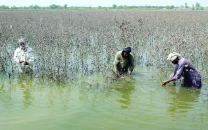Online survey: ‘Rule of law, human rights and gender inequalities worry most Pakistanis’
GCUF studies issues for post-2015 development agenda.

UNDP’s Anjum says that 1 billion people in the world are undernourished and more than 205 million unemployed.
An online survey conducted by the Directorate of Students Affairs at the Government College University Faisalabad (GCUF) has revealed that issues pertaining to rule of law, human rights and gender inequality have been prioritised as biggest problems people face in Pakistan.
The survey was taken at on the instructions of Vice Chancellor Zakir Hussain. It was titled: Prioritisation themes- Issues for Post-2015 Development Agenda from Pakistani Perspective. It was carried in collaboration with the United Nations Development Programme (UNDP). The questions were put up on the university website.
Addressing a seminar held to share the survey results with the students and faculty, Prof Hussain said that it was meant to prioritise issues that the nation needed to cope with and to map out a comprehensive strategy to move the country up on development indicators in the post-2015 world.
Faculty of Arts and Social Sciences Dean Prof Pervez Azim, Faculty of Science and Technology Dean Prof Naureen Aziz Qureshi and UNDP Programme Officer Shakeel Anjum attended the seminar as the guests of honour. The speakers included Students Affairs Director Dr Nadeem Sohail and Dr Sofia Anwar.
Prof Azim said there were 2,243 respondents. Major problems, the respondents prioritised, included impediments to human development, lack of food security, energy crisis, lack of social development, gender inequality, violence against women and failure to protect and rehabilitate people before and after calamities.
Talking about global challenges, UNDP’s Anjum said that 1 billion people in the world were undernourished and more than 205 million unemployed. Quoting from recent UNDP data, he said that only 28 per cent of the world population was covered by social protection systems.
He said that half of the world’s forests in 1980 had been cut due to increasing population and urbanization. He said carbon dioxide emissions had increased by 40 per cent over the period. He said that the incidence of natural disasters had increased five times in the last four decades.
“The UNDP is actively working on the agenda of post-2015 world to cater to the emerging needs and find solutions to the problems.”
Prof Qureshi said that governments as well as non government organisations must use data from such surveys to analyse priority issues.
She urged for devising a comprehensive plan to tackle various issues Pakistan was facing.
“Over 60 per cent of Pakistan’s population is under 30-years-old. Plans must be devised keeping that in mind,” she suggested.
She also stressed the need to enhance the youth’s role in the development of the country by training them.
Dr Anwar explained that respondents were asked to score problems from 1-9; 1 being the most important.
Published in The Express Tribune, March 1st, 2013.



















COMMENTS
Comments are moderated and generally will be posted if they are on-topic and not abusive.
For more information, please see our Comments FAQ